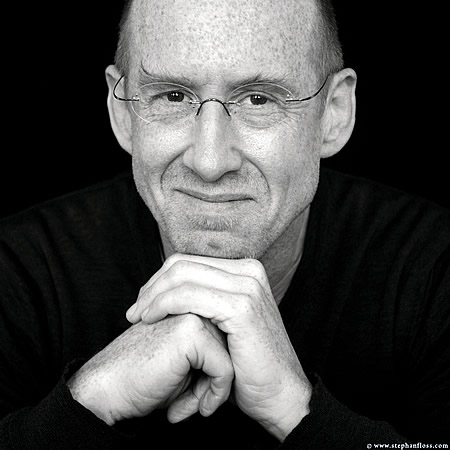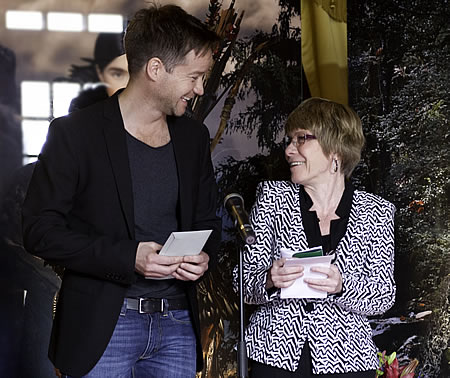The Carina Ari Medal 2014

THE CARINA ARI MEDAL 2014 is awarded to William Forsythe, for his groundbreaking and timeless choreographies, with their fascinating combination of classical ballet and contemporary dance that continuously explores and challenges the limits of movement. Incredibly rich in variation, the choreographies of William Forsythe are a constant inspiration to dance-lovers all over the world. His impact on Swedish dance is indisputable – on the Cullberg Ballet, Gothenburg and Malmö, and all over the country. And not least on the Royal Swedish Ballet, where we can currently enjoy his beautiful Artifact Suite.
The jury of the Carina Ari Foundation consists of principal Ellen Rasch, professor and royal court dancer Ana Laguna, and Gunilla Jensen, dance critic and dramaturge.

William Forsythe. Photo: Stephan Floss, www.stephanfloss.com
Download press photo in hi-resolution
According to the statutes of the Carina Ari Memorial Fund, the prestigious gold medal award, created and founded by Carina Ari in 1964, should be given to a person who has commendably promoted Swedish dance. And no one can deny that WILLIAM "BILL" FORSYTHE has done precisely that.
Born in 1949 in New York, Forsythe began his career as a dancer in the Joffrey Ballet in 1971. The following year, he left the USA for Stuttgart together with his then wife Eileen Brady, and has since worked mainly in Europe. The artistic director of the Stuttgart Ballet, Marcia Haydée, discovered Forsythe's choreographic talent early on, and appointed him resident choreographer in 1976. This led to a prolific creative period for both European and American dance companies. He subsequently became director of the Frankfurt Ballet in 1984, a position he held until 2004. Today, he is the head of the Forsythe Ballet, which is based in two cities, Dresden and Frankfurt. In recent years, he has also worked with performance and installation art, with projects such as "White Bouncy Castle", in association with Daren Caspersen and Joel Ryan, and "You Made Me a Monster".
Forsythe creates his works on a classical foundation, in a highly personal fusion with contemporary dance. His choreographic idiom shows influences from Balanchine's neoclassicism but reaches much further – stretching the limits of movement, exploring combinations and constellations in an almost unbelievably varied flow. Forsythe is a trailblazing anarchist who has inspired and regenerated modern dance, refining the art form both musically and dance-wise.
In Sweden, Forsythe was introduced by the Cullberg Ballet with "The Vile Parody of Address". The Gothenburg Opera featured Forsythe's choreographies in the 1990s, and in the late 1980s, the Royal Opera in Stockholm acquired "In the Middle, Somewhat Elevated" – an extremely demanding, equilibristic chamber piece that is still on the repertoire and has become something of a modern classic for our national ballet company. Other Forsythe ballets that have been performed in Sweden are "Second Detail", "Loss of Small Detail" and "One Flat Thing, Reproduced".
In 1984, Forsythe created a full-length ballet, "Artifact", a central work in his long list of productions. When the Frankfurt Ballet made a guest performance at the Royal Opera in Stockholm a decade later, "Artifact" was on the programme and made a profound impression on the Swedish dance scene.
In 2014, the new triple bill for the spring season presented by the head of the Royal Ballet Johannes Öhman is a tribute to the legendary choreographer. "Bill" is the title of the programme, which starts with "Artifact Suite", with highlights from the full-length ballet, now compressed into 45 minutes. For those who have seen it before the experience is intense, and the response from first-time viewers is distinctly enthusiastic. 36 dancers from the Royal Ballet take on this breathtakingly strenuous choreography with aplomb, with Forsythe appearing in person as an added bonus on the opening night. The rehearsals are handled by Forsythe's peerless assistants Agnès Noltenius – who danced in the Frankfurt Ballet's guest performance in 1994 – and Noa Gelber. Bach's music was seemingly written especially for these intricate movement patterns. Johannes Öhman's ambition has been to convey to the ballet audience "the important step" that is necessary for the continued development of dance.
Forsythe describes his work as "a ballet about ballet". A piece of modern dance history with a revitalising effect on dance and dance lovers all over the world.
Now, that is worthy of a Carina Ari Medal!
GUNILLA JENSEN

On behalf of William Forsythe Royal Swedish Ballet's artistic director Johannes Öhman received the Carina Ari Medal. Gunilla Jensen recited Forsythe's words of thanks and greetings.
The jury of the Carina Ari Foundation consists of principal Ellen Rasch, professor and royal court dancer Ana Laguna, and Gunilla Jensen, dance critic and dramaturge.

William Forsythe. Photo: Stephan Floss, www.stephanfloss.com
Download press photo in hi-resolution
Legendary dance is awarded the 2014 Carina Ari Medal
According to the statutes of the Carina Ari Memorial Fund, the prestigious gold medal award, created and founded by Carina Ari in 1964, should be given to a person who has commendably promoted Swedish dance. And no one can deny that WILLIAM "BILL" FORSYTHE has done precisely that.
Born in 1949 in New York, Forsythe began his career as a dancer in the Joffrey Ballet in 1971. The following year, he left the USA for Stuttgart together with his then wife Eileen Brady, and has since worked mainly in Europe. The artistic director of the Stuttgart Ballet, Marcia Haydée, discovered Forsythe's choreographic talent early on, and appointed him resident choreographer in 1976. This led to a prolific creative period for both European and American dance companies. He subsequently became director of the Frankfurt Ballet in 1984, a position he held until 2004. Today, he is the head of the Forsythe Ballet, which is based in two cities, Dresden and Frankfurt. In recent years, he has also worked with performance and installation art, with projects such as "White Bouncy Castle", in association with Daren Caspersen and Joel Ryan, and "You Made Me a Monster".
Forsythe creates his works on a classical foundation, in a highly personal fusion with contemporary dance. His choreographic idiom shows influences from Balanchine's neoclassicism but reaches much further – stretching the limits of movement, exploring combinations and constellations in an almost unbelievably varied flow. Forsythe is a trailblazing anarchist who has inspired and regenerated modern dance, refining the art form both musically and dance-wise.
In Sweden, Forsythe was introduced by the Cullberg Ballet with "The Vile Parody of Address". The Gothenburg Opera featured Forsythe's choreographies in the 1990s, and in the late 1980s, the Royal Opera in Stockholm acquired "In the Middle, Somewhat Elevated" – an extremely demanding, equilibristic chamber piece that is still on the repertoire and has become something of a modern classic for our national ballet company. Other Forsythe ballets that have been performed in Sweden are "Second Detail", "Loss of Small Detail" and "One Flat Thing, Reproduced".
In 1984, Forsythe created a full-length ballet, "Artifact", a central work in his long list of productions. When the Frankfurt Ballet made a guest performance at the Royal Opera in Stockholm a decade later, "Artifact" was on the programme and made a profound impression on the Swedish dance scene.
In 2014, the new triple bill for the spring season presented by the head of the Royal Ballet Johannes Öhman is a tribute to the legendary choreographer. "Bill" is the title of the programme, which starts with "Artifact Suite", with highlights from the full-length ballet, now compressed into 45 minutes. For those who have seen it before the experience is intense, and the response from first-time viewers is distinctly enthusiastic. 36 dancers from the Royal Ballet take on this breathtakingly strenuous choreography with aplomb, with Forsythe appearing in person as an added bonus on the opening night. The rehearsals are handled by Forsythe's peerless assistants Agnès Noltenius – who danced in the Frankfurt Ballet's guest performance in 1994 – and Noa Gelber. Bach's music was seemingly written especially for these intricate movement patterns. Johannes Öhman's ambition has been to convey to the ballet audience "the important step" that is necessary for the continued development of dance.
Forsythe describes his work as "a ballet about ballet". A piece of modern dance history with a revitalising effect on dance and dance lovers all over the world.
Now, that is worthy of a Carina Ari Medal!
GUNILLA JENSEN

On behalf of William Forsythe Royal Swedish Ballet's artistic director Johannes Öhman received the Carina Ari Medal. Gunilla Jensen recited Forsythe's words of thanks and greetings.


 På Svenska
På Svenska In English
In English